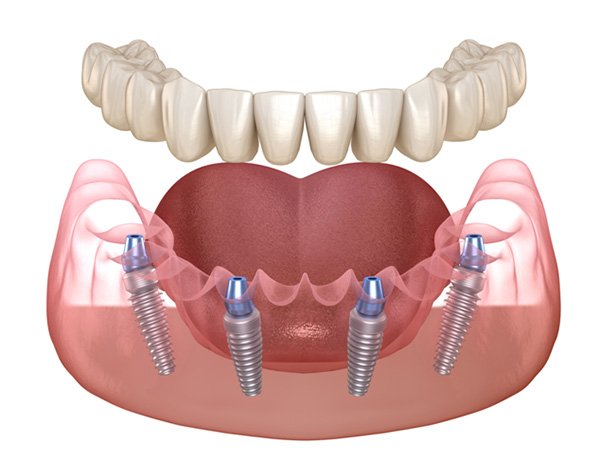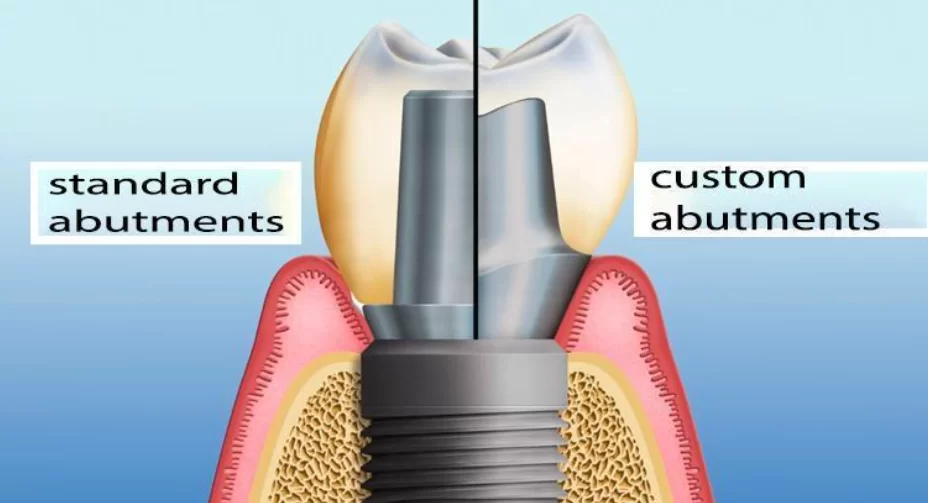Different types of Dental Implants
Dental implants stand as a testament to modern dentistry's innovations, providing an array of solutions for missing teeth. If you’re considering dental implants but are confused about all the different types of implants out there this guide will help you understand all the options available.
What Is a Dental Implant?
A dental implant is a titanium screw, surgically positioned into the jawbone below the gums. It serves as a foundation for replacement teeth, mimicking the strength and stability of natural tooth roots. If the jawbone isn't up to par in terms of density or strength, additional procedures like bone grafting or sinus lifts come into play. These ensure the implant has a strong bone foundation, paving the way for long-term success.
You can read more about implants in general here.
The main types of dental implants
Single Tooth Implant
This is the go-to solution for a singular missing tooth. Once the implant is placed and has integrated with the jawbone, a crown, designed to match the natural teeth is secured on top. This seamlessly merges with the neighbouring teeth, bringing back function and aesthetic appeal.
Implant Supported Bridge
An implant-supported bridge is likely to be the best option for those missing multiple teeth next to each other. Instead of implanting a base for every missing tooth, just a couple of implants can serve as the anchor for a bridge. This bridge, made of durable materials, effectively replaces the absent teeth, making their loss virtually unnoticeable.
For example, if you have a gap of 4 teeth, you can place 1 implant at each end and create a bridge on top, replacing all 4 teeth in go.
Full Arch Implants - All on 4 - All on 6
Full arch implants come to the rescue in scenarios of extensive tooth loss where you have no teeth left. Through this method, multiple implants are strategically placed to support a complete set of teeth (usually 4 or 6 implants in total, depending on the quality of your bone).
Full arch implants will not just transform your smile but will also restore your facial contour and structure.
Once the 4-6 implants have been placed, a bridge will be fixed onto those implants to replace the entire row.
Implant Retained Dentures
Implant-retained dentures are a cheaper option for people who can’t afford full arch implants. Your dentist will place 2-4 implants in your jaw bone and then make a removable denture that can click in to those implants for extra stability.
There are 2 main types of connections used for the implants and denture.
Locators: Little ball attachments on the implants that allow the denture to snap into place.
Bar: The implants are interconnected with a metal bar, onto which the denture clips, offering enhanced stability.
The ideal option is to have 4 implants in the upper arch with a bar and 2 implants in the lower arch with either locators or a bar.
Smile in a Day Treatment
You will often see ‘Smile in a day’ or ‘Same day smile’ treatment being offered at many clinics. This usually refers to full arch implant treatment where a dentist and technician work together to extract any remaining teeth, plane implants and fix a provisional implant bridge, all in one day.
This treatment requires a lot of skill to pull off successfully and although it is advertised as a one-day procedure. There are often a lot of stages to the full treatment. Usually, you will leave the dentist with a provisional bridge which will require replacing a few months later.
Some more technical differences between implants
Cement vs screw retained Implant crowns
As mentioned above, implants are the screws that fix into your jaw bone and on top of the implant, a crown or bridge will be placed to replace your tooth. These crowns will either be cemented (glued) in place or screwed in.
You should almost always make sure your implant is a screw-retained implant. They are much easier to replace in the future and the lack of cement to clean up means they are easier to clean and lead to fewer problems in the future.
You only really need to have a cement-retained crown in limited situations where the position of the implant is not ideal to hide the screw hole in your crown.
Stock vs. custom components (abutments)
The abutment of an implant is the interface in between the implant itself and the crown that sits on top of it. These come as premade stock abutments that are a universal fit and custom abutments, ones made in a lab shaped specifically for your tooth.
The choice between stock and custom components is crucial. Stock components are pre-fabricated, offering cost-effectiveness and speed. However, they might fall short of mimicking a natural gum line. On the other hand, custom components tailored for an individual's mouth ensure a flawless appearance.
Custom abutments are ideal, especially for front teeth as they will allow your dentist to make the implant look natural around the gum and it will be easier for you to clean, however they are more expensive.
When you see dental clinics offering cheap implants and same day treatment, it is because they are using stock abutments which alow them to offer lower prices but the outcomes will not be as good.
Mini Implants
Tailored for tight spaces or where bone structure is minimal, mini implants with smaller diameters, are often the solution. They can nestle comfortably even in challenging terrains.
Zygomatic Implants
Reserved for the most complex scenarios where the jawbone isn't viable for regular implants, the zygomatic implant anchors not to the jaw but to the zygoma (cheekbone).
Zygomatic implants are a specialised solution, used sparingly but offer hope in otherwise bleak situations.
Dental implant brands
There are hundreds of different dental implant brands available in the market. Our advice is to speak to your dentist about what they are using and focus more on the dentist's skill rather than the implant brand. Dentists usually get trained on how to use a few different types and will often stock their clinics with what they are most comfortable with.
As long as your dentist is using a reputable brand, then you should be okay. If your dentist uses a smaller brand that is cheaper, your treatment may be okay, but if you move to a different location in the future, it may be harder to find the right components to carry out repairs.
We’ve listed some of the biggest implant brands below but please note that this is not an exhaustive list of trusted implants.
Nobel Biocare
Origin: Sweden
Overview: One of the pioneers in the dental implant industry, Nobel Biocare has been at the forefront of implant innovation. They introduced the concept of osseointegration and have a range of implant systems, including the popular All-on-4 treatment.
Straumann
Origin: Switzerland
Overview: A global leader in dental implantology, Straumann is renowned for its high-quality implants, regenerative products, and digital dentistry solutions. Their portfolio covers a wide range of bone-level and tissue-level implants.
Dentsply Sirona
Origin: USA
Overview: Born from the merger of DENTSPLY and Sirona, this brand offers a comprehensive range of dental solutions. Their implant segment is robust, offering various solutions for different clinical situations.
Zimmer Biomet
Origin: USA
Overview: This company is not exclusively focused on dentistry but has a significant dental division. They offer a variety of implants, abutments, and regenerative products.
BioHorizons
Origin: USA
Overview: BioHorizons has made its mark by emphasizing biologically driven dental implant solutions. They boast innovations in implant designs and surface treatments.
Osstem Implant
Origin: South Korea
Overview: One of Asia's leading implant brands, Osstem is recognized for its quality and affordability. They've steadily increased their global presence and offer a range of implant and regenerative products.
Neoss
Origin: UK
Overview: Neoss focuses on simplicity and innovation. They provide a streamlined product portfolio that aims to simplify the implant process for both dentists and patients.
Megagen
Origin: South Korea
Overview: Known for its AnyRidge implant system, Megagen has a presence in numerous countries and emphasizes innovative implant solutions that draw from clinical and scientific research.
Considering The Bigger Picture
When looking at dental implants, it's more than just understanding the types. Their long-term success hinges on quality, the dentist's expertise, and post-operative care. Regular dental visits, stellar oral hygiene, and consistent check-ups are non-negotiable to maintain implant health.
Financial implications are pivotal too. While top-notch implants come with an initial cost surge, their durability and fewer complications can render them cost-effective in the long haul.
Conclusion
To opt for dental implants is to invest in your smile, confidence, and well-being. By discerning the plethora of implant types and their implications, you're poised to make an informed decision. Coupled with the guidance of a seasoned dental professional, dental implants can indeed be your passport to a radiant, unwavering smile.






